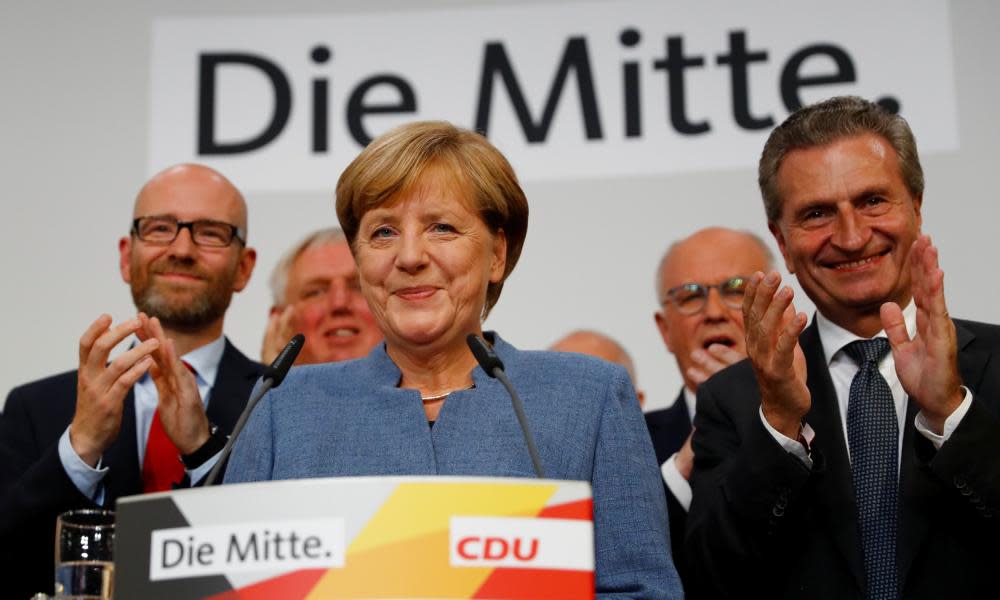Merkel wins fourth term but far-right AfD surge to third in German election

Angela Merkel has secured a fourth term as German chancellor but with her authority diminished, after her conservative bloc secured the lead position in parliamentary elections but failed to halt the march of rightwing populists.
The Alternative für Deutschland (AfD) was celebrating its historic third place success on Sunday night, having secured 13% of the vote, according to exit polls, marking the first time in almost six decades that an openly nationalist party will enter the Bundestag.
Merkel’s centre-right Christian Democrat-led alliance secured around 33.5% of the vote according to exit polls, 12.5 points ahead of her main rivals, Martin Schulz’s centre-left Social Democrats, who according to initial results had secured 21 points, marking a historical low for Germany’s oldest party and pushing it on to the opposition benches.
Addressing CDU supporters in Berlin, a somewhat subdued looking Merkel thanked “voters who put their trust in us”. She said the “strategic goals” of her party’s election campaign had been reached, and gave her a clear mandate to form the next government, but she called the outcome “a result which was not as good as we had expected”.
She also promised to listen to the “concerns and anxieties” of AfD voters in order to win back their votes.
The AfD’s propulsion into parliament just four years into its existence gives the country its first far-right force on the national stage since 1961, and a faction with the most substantial presence of rightwing extremists since the Nazi era.
The AfD will become the third largest party, and is on course to occupy 86 seats in the Bundestag compared to the CDU/CSU’s 221 and the SPD’s 139.
Alexander Gauland, the AfD’s top candidate, reacted immediately to the news. Addressing euphoric party members at the party’s Berlin headquarters, he pledged that his party would change Germany.
“This is a great day for our party’s history. We are entering the Bundestag for the first time and we will change this country.”
Analysts were quick to call the result a belated national referendum on Merkel’s open door refugee policy, which led to around a million refugees arriving in Germany in the summer of 2015. It was the first national election since the crisis.
The victory was seen as a bittersweet one for Merkel with her alliance having lost around 8% of the vote compared to the last election. The SPD was down by almost 5%.
The AfD saw gains of more than 8% on its 2013 result, when it failed to reach the 5% hurdle that would have allowed it into the Bundestag.
Voter turnout stood at 77% – a 5.5% increase on 2013 – after voters were urged by leaders of the mainstream parties to turn out in force in an attempt to counter the rise of the right.
Renate Künast, a leading Green, whose party did better than expected, said the result had to be seen as a slap in the face for the government, but it was the responsibility of all parties to address the concerns of AfD voters. “We must respond to the AfD voters and those people who clearly feel misunderstood,” she said.
The results followed a campaign that had been decidedly dull, with the CDU/CSU and SPD appearing determined to avoid tackling the emotions triggered by the refugee crisis, while the AfD ensured the issue was at the top of their campaign agenda, often addressing concerns such as the impact that Muslim migrants are perceived as having on German society.
AfD supporters were vociferous protesters at Merkel’s rallies throughout the campaign, repeating their claims that she was a traitor and calling for her to go.
The results sparked a demonstration on Berlin’s Alexander Platz, with hundreds of anti-AfD protesters gathering with banners against the party.
Speaking to subdued supporters, Schulz of the SPD pledged that his party would “bear the consequences” and enter the opposition benches, in recognition he said that voters had signalled that they did not wish a continuation of the grand coalition between the SPD and CDU/CSU, which has dominated most of Merkel’s time in government since 2005. “Today is a difficult and bitter day for social democracy in Germany,” he said, adding that the party had “failed in our election purpose” and had not managed to mobilise the party’s traditional base.
Christian Lindner, head of the pro-business Free Democratic party, celebrated the fact his party was back in parliament, having bowed out in 2013 when it received less than 5%. His party is now on course to enter a coalition government. “As from now there is once again a Freedom faction in Germany, because the people allowed us to make a comeback,” he said, calling the result a “new start” for his party.
Mathematically the most likely outcome is a coalition government between Merkel’s coalition alliance and the pro-business Liberal Democrats together with the Greens, a so-called Jamaica coalition, which has never been tried on the national stage before.
A Jamaica coalition is a term used in German politics to describe a coalition made up of the Christian Democratic Union party, the Free Democratic Party, and the Green Party.
The name derives from the fact that the colours symbolising the three parties involved - black for the CDU, yellow for the FDP, and green for the Green Party, are also the colours of the Jamaican national flag.

 Yahoo News
Yahoo News 
